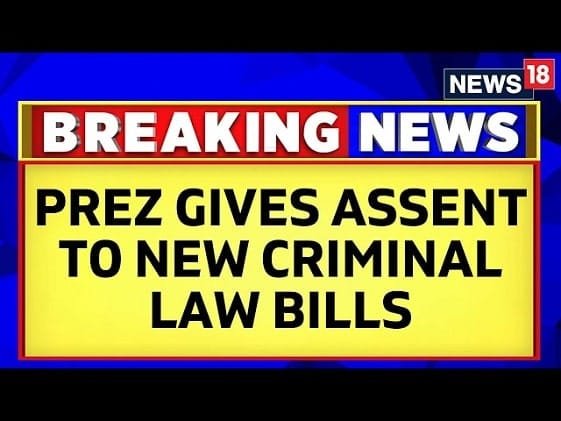Criminal Law Bills and the President’s Role: A Look at India’s Recent Reforms

The Indian Parliament witnessed a flurry of activity in late 2023 with the passing of three significant criminal law bills. These bills, the Bhartiya Nyaya Sanhita (BNS), Bharatiya Nagarik Suraksha Sanhita (BNSS), and the Bharatiya Sakshya Act (BSA), aimed to overhaul India’s colonial-era criminal justice system. However, the journey from legislative approval to actual implementation requires the President’s assent. This article delves into the recent criminal law bills, the President’s role in their enactment, and the potential impact of these reforms.
Understanding the Criminal Law Bills: A Glimpse into the Reforms
The three bills passed by Parliament represent a comprehensive attempt to modernize India’s criminal justice system. Let’s explore them in detail:
Bharatiya Nyaya Sanhita (BNS): This bill replaces the Indian Penal Code (IPC) of 1860. It aims to:
- Modernize Offenses: Include new offenses reflecting contemporary concerns like cybercrime, stalking, and financial fraud.
- Refine Existing Offenses: Redefine existing offenses to align with current societal needs and legal interpretations.
- Standardize Penalties: Establish a more consistent and proportionate sentencing framework for various offenses.
Bharatiya Nagarik Suraksha Sanhita (BNSS): This bill replaces the Code of Criminal Procedure (CrPC) of 1973. It focuses on:
- Victim Rights: Enhance victim protection measures, including witness protection and speedy trial mechanisms.
- Investigative Procedures: Streamline investigative procedures to ensure efficiency and uphold fair trial principles.
- Police Reforms: Address police accountability and introduce provisions for community policing initiatives.
Bharatiya Sakshya Act (BSA): This bill replaces the Indian Evidence Act of 1872. It seeks to:
- Strengthen Admissibility of Evidence: Modernize the rules of evidence to allow for admissibility of electronic records and scientific advancements in forensic technology.
- Witness Protection: Provide greater safeguards for witnesses, encouraging them to come forward and reducing the fear of intimidation.
- Burden of Proof: Clarify the burden of proof in criminal cases, ensuring a fair and balanced trial process.
It’s important to note: These are just some of the key objectives of the bills. Each bill contains a plethora of detailed provisions outlining the proposed changes to the criminal justice system.
The President’s Role: Assent and Beyond
The President of India plays a crucial role in enacting legislation passed by Parliament. After a bill is passed, it is sent to the President for assent. This signifies Presidential approval and paves the way for the bill to become a law.
In the case of the criminal law bills, President Droupadi Murmu granted her assent in January 2024, allowing the historic reforms to move forward. However, the President’s role extends beyond simply signing the bills. Here’s what else to consider:
- Scrutiny and Consultation: The President can potentially withhold assent if they have concerns about the constitutionality or practicality of the bills. They may consult with legal experts and stakeholders before making a decision.
- Ordinance-Making Power: In some cases, the President can promulgate ordinances to introduce temporary legal measures. However, this power is typically used in situations of urgency and wouldn’t be applicable here.
The Road Ahead: Implementation and Potential Impact
With the President’s assent granted, the focus shifts to implementation. Here’s what lies ahead Click Here:
- Notification: The Ministry of Home Affairs typically issues a notification specifying the date the new laws come into effect.
- Training and Capacity Building: Law enforcement agencies, judiciary, and legal professionals will require training to understand and apply the new provisions effectively.
- Public Awareness: Public awareness campaigns are crucial to educating citizens about their rights and obligations under the reformed system.
The potential impact of these reforms is significant. Here are some anticipated outcomes:
- Enhanced Efficiency: Streamlined procedures and modernized laws could lead to faster case resolutions and a more efficient criminal justice system.
- Improved Victim Support: Stronger victim protection measures could empower victims and encourage them to report crimes.
- Fairer Trials: Clearer evidentiary rules and a focus on due process could lead to fairer trials and uphold the principles of justice.
However, challenges also exist:
- Implementation Hurdles: Successfully implementing such wide-ranging reforms requires strong infrastructure, trained personnel, and adequate resources.
- Police Reforms: Effective police reforms are crucial for ensuring the fair and efficient application of the new laws.
- Constitutional Scrutiny: The new laws could face legal challenges based on criminal law bills president.



